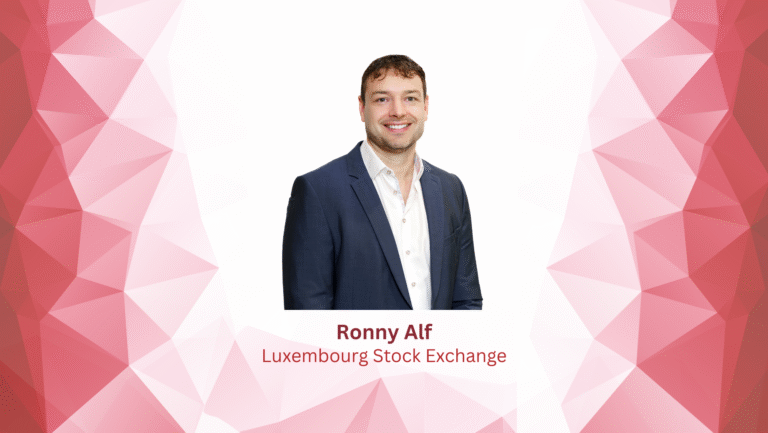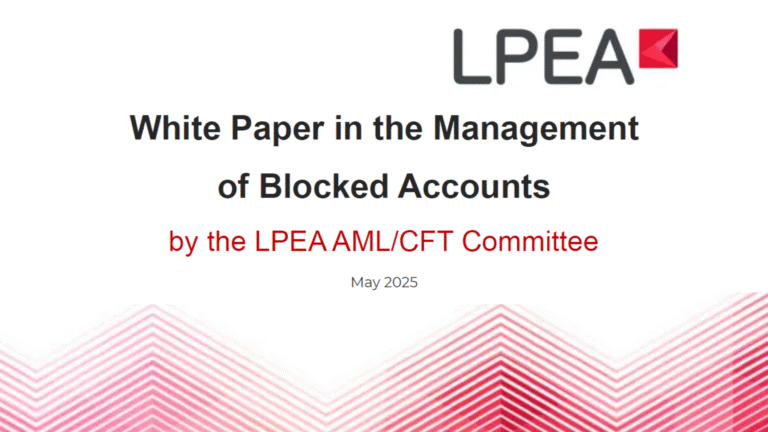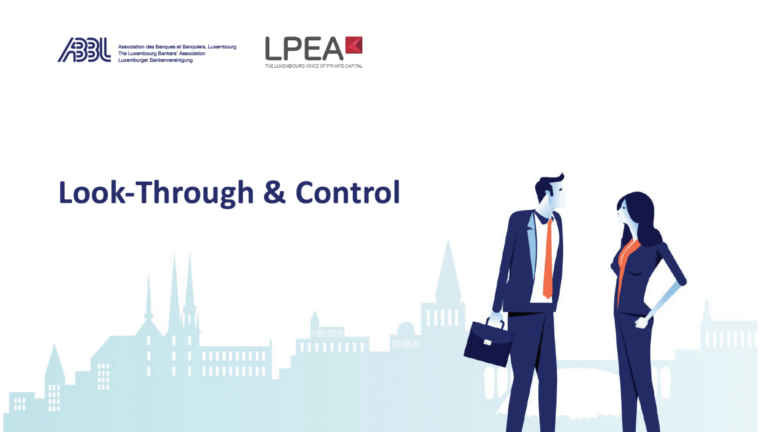Sean O’Driscoll, Country Head of Universal-Investment Luxembourg
is interviewed by Laurent Capolaghi, Private Equity Leader EY Luxembourg and Member of the Executive Committee of the LPEA
EY: Universal-Investment Group is amongst the largest independent investment companies in German-speaking Europe. The Group decided long ago to set up a subsidiary in Luxembourg: that was in the year 2000 and as such you are twice as old as LPEA. Sean – can you please tell us about your Luxembourg track record?
Universal-Investment: The decision to establish an office in Luxembourg was made as German clients increasingly requested solutions that could be best delivered through the world’s second biggest fund domicile. This primarily involved Alternative Investments in a well-respected and strong regulatory environment. Since then, we have continued to evolve this way: developing our fund administration services, ManCo offerings and solutions to meet our clients’ needs. In the past twenty years, we managed to increase our Assets under Administration to 85 bn Euros, of which approximately 62 per cent are allocated in Alternative Investments.
Can you please elaborate on the assets that you are managing and the profile of the asset owner?
The Alternative Investments I mentioned are primarily managed for German – and increasingly European – institutional investors, among them pension schemes, insurers or corporates. The fact that many of our direct clients are institutional has allowed us to develop a strong expertise and understanding of their needs and requirements including fund raising capacities. Nevertheless, we are also increasingly active with asset managers not only in Europe but also in Asia and the USA.
Our significant investments since our creation allow us to cover most of the alternative asset classes: private equity, real estate, infrastructure and debt. In addition, we also offer UCITS solutions. A significant portion of our local client base in this area are fund initiators with proven track records in their local market, aiming to bring their investment strategies to a broader audience across Europe and the world.
You mentioned your fund-raising capacity, can you please expand on this?
We are confident that distribution capabilities will become more important in the future and have thus made investments in our own abilities to connect asset managers with investors. We have developed a distribution and asset raising service model covering the DACH region and currently explore options of expanding that coverage across Europe and beyond. Our aim is to set up a one-stop distribution platform. In this sense, we have acquired a start-up called CAPinside last year. They successfully run a digital marketing and distribution platform for the investment community.
You cover the complete range of asset classes. Which role does private equity and debt play as of today and which role do you expect it to play in the future?
Both asset classes have become major cornerstones in our asset development in the past five years. At the beginning of 2015, we managed a little less than 10 bn Euros in assets in hedge funds, private equity, private debt and securitizations in Luxembourg. This volume more than quintupled since then. Today, private equity makes up 42 percent of our assets, whereas debt structures hold about a third.
With no end in sight of the low interest rate environment, we believe that investors’ appetite for private equity and private debt will continue to be strong. Particularly private debt and loan origination has enjoyed strong growth on our platform in recent months and we think this trend will continue. Investors will continue to look for returns outside the bond segment and are going to exhaust their investment limits for real estate and alternative investments.
There is a long-lasting debate about Luxembourg becoming a more attractive location for portfolio management teams and expanding its value chain. What is your view on this?
Luxembourg has a strong track record as a fund domicile, but for various reasons not as a portfolio management hub. Nevertheless, in the last two decades the Grand Duchy developed a great eco-system for the fund industry that can be further built on. I think the current situation in Europe offers a lot of opportunities for the location to become more attractive for portfolio management services.
The Brexit will have long-term effects on the city that we are not seeing to its full extend yet. In combination with the ongoing pandemic, employees and employers will look at different options. The high standard of living that Luxembourg promises in combination with the existing structures of the financial industry is a plus. However, I think the educational infrastructure could be more targeted – I am thinking here of the London School of Economics or the Frankfurt School.
Since 2017, you are Private Equity backed. How has this partnership impacted your business? Did it also change the culture respectively the values of Universal-Investment Group?
Indeed, our shareholder Montagu Private Equity has impacted our business quite significantly, but not in the way most people would think when they hear private equity. Montagu has significantly been investing in the further development of the group and driving the internationalization of our business. Being myself a US citizen, my appointment as Country Head of Universal-Investment Luxembourg can presumably serve as further proof of our internationalization process.
Since Montagu’s engagement we have been investing significantly in our IT capabilities, we created an innovation agenda along our value chain and built up an Emerging Tech Team that analyses, evaluates and implements technology. For example, we have implemented an Artificial Intelligence and Machine Learning solution to unburden staff from manual, repetitive workload and gain in efficiency. We are also looking at the blockchain technology, which will probably have the biggest revolutionary impact on the investment industry in the next year.
Universal has made some recent acquisitions, can you please expand on these acquisitions?
Next to organic growth, digital transformation and internalization, M&A has been an important pillar in our group’s strategy. The objectives are to extend our service offerings and to enter new markets. I think we have made great progress in this area. In early 2019, we further extended our value chain by taking over UI labs, a leading IT service provider for the financial industry offering, among other services, front office solutions.
The most recent acquisitions have been CAPinside, which I mentioned, but also the acquisition of a large fund administration platform, which will allow us to offer clients solutions in Europe’s three major funds hubs: Luxembourg, Frankfurt and Dublin.
Speaking about Luxembourg, what would you consider the key differentiating factor of Luxembourg as a business place? What would you consider its key advantage and what its biggest disadvantage?
Luxembourg has had an amazing 30-year streak in the funds business, being the benchmark in terms of efficiency, pricing and time to market. However, we need to keep this focus, as the international market is increasingly competitive. What I also consider a key advantage as a business place is its diversity. As people from various countries, with multiple language skills, come and work together – there are always multiple ways to approaching a problem and finding a solution.
However, Luxembourg’s biggest challenge is also tied to this aspect. Recruitment is becoming increasingly difficult as resources are scarce and the industry constantly needs to attract very skilled, knowledgeable and experienced people with specific competencies. Luxembourg is competing for ESG, alternative funds, along with risk and compliance experts. With enhanced substance requirements, introduction of the RC (responsable du contrôle du respect des obligations) and other requirements, it is not just business we are competing for, it is also skilled resources. It is thus important that both Luxembourg as a location and our firm maintain a highly attractive brand!




